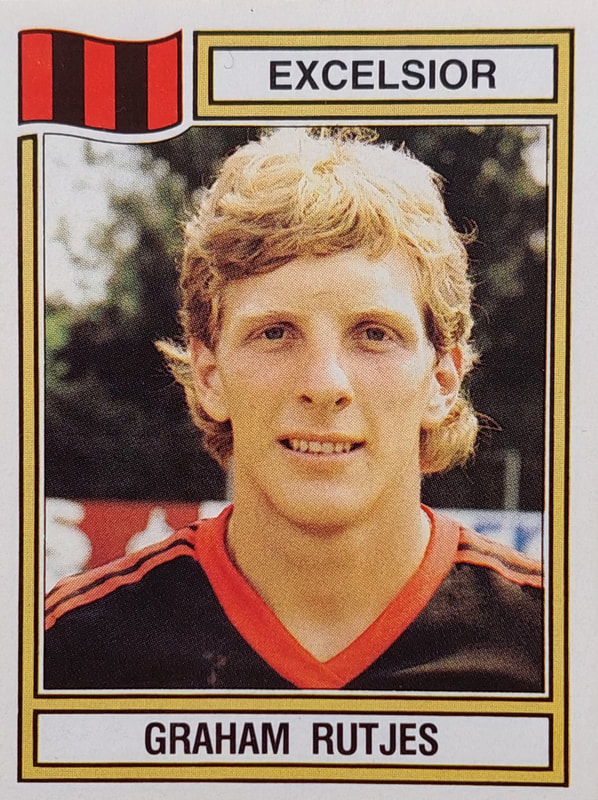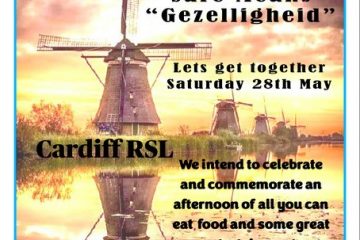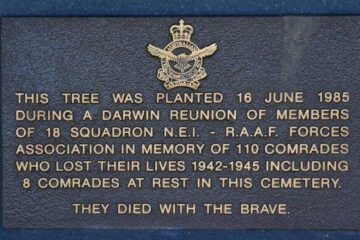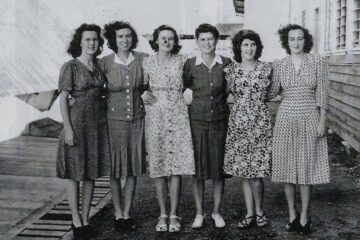Published in the Dutch Courier March 2022
‘I was always interested in the Australian players who came to Europe when I was playing,’ Graeme Rutjes, former Netherlands International, tells me. We’re chatting via What’s App, Graeme at the golf course he manages near Utrecht, me at home in Hobart.[1]

What makes Graeme unique amongst Oranje players is that he was born in Australia, the son of Dutch emigrants. ‘When you’re Dutch and playing football professionally but born in Australia, that’s something special. It was written about when I started, and when I made the Dutch team. Born in Sydney but Dutch.’
Graeme’s parents arrived in Australia in 1956, newly married and looking to start a new life. Graeme was born in 1960. The Rutjes were settled near Centennial Park, his mum raising two boys, his dad working for Hunter Douglas, the Dutch window and blinds manufacturer, when Graeme’s Opa in Holland died suddenly. In the winter of 1963, the family returned to Holland to support his widowed Oma. ‘I was born there but I can’t remember anything of my first three years.’
Graeme grew up in Rotterdam and followed Feyenoord, one of Holland’s biggest clubs. He started playing when he was ten and a couple of years later, he and team-mates went to Feyenoord to try out with their youth team. They were turned away. The Dutch system didn’t allow for kids to simply roll up, wanting a game – they had to be invited to trial by a club. ‘Most players are selected by the clubs when they are eleven or twelve or thirteen, and then by the time they are eighteen or nineteen, they’re in the First team. I started when I was nineteen, going to Excelsior – I did it by myself.’
Excelsior is the minnow of Rotterdam’s three senior football clubs.[2] Graeme had begun studying economics at Erasmus University; Excelsior’s grounds were next door, so he approached the club to trial with them. The trainer of the Seconds, Rob Jacobs, let him train with his team, liked what he saw and invited him back. Graeme spent a year with the Seconds before debuting with the senior side in 1980; he stayed five years, amassing 149 games, and settling into the role of defender. He also continued with his studies, lugging textbooks to training camps and onto the buses carrying the team to and from matches. ‘In those days players liked to play cards and games on the buses. I had my study books with me.’
Graeme transferred to KV Mechelen in the Belgium League in 1985, staying with the club five years – and 153 games – through its greatest era, including a European trophy and a domestic cup and title. Six years – and another 152 games – at RSC Anderlecht, one of Belgium’s most successful clubs, followed.
Australian players first appeared in Continental Europe around this time, catching Graeme’s attention, especially those playing in Holland and Belgium. Striker Eddie Krncevic, starring with Anderlecht while Graeme was at KV Mechelen, made a particular impression. ‘I really liked playing against him. Always a hard fight, clear duels. He was a tall, slim guy and he could jump very high. Like an Aussie rules player. He knew how to jump and stay in the air; he was always hard to fight against. And when it was over, all the elbows, and we’d kicked each other, it was done and over with,’ Graeme laughs. ‘He was fun to play against.’
‘Graeme’s one of the best defenders I ever played against,’ Eddie tells me later. ‘I couldn’t score on him. I finally broke my duck in a Belgian Cup match at home. The return game at Mechelen I didn’t touch the ball, he had me in his back pocket.’ [3]
Graeme also played against Graham Arnold. ‘Another tough player – wasn’t mean, hard to fight against. Same as Eddie, the duels were tough, but afterwards, always fine.’ Frank Farina was a star in Belgium in this period. ‘He was a good striker, smart, quick for the first few metres, hard to play against…and a nice guy.’ Paul Okon was a teammate of Farina’s though his defensive role meant he and Graeme rarely clashed. Aurelio Vidmar topped Belgium’s goalscoring while at Standard Liege in 1994-95. ‘He was smart, not sneaky, he had a nose for the goal.’ Such a nose that Graeme recalls hitting him hard early in an important end-of-season match when he was at Anderlecht. Anderlecht went on to win the game.[4]
Eddie knew of Graeme’s Australian background, at one stage urging Socceroo coach, Frank Arok, to cap him. But no one ever approached Graeme to play for Australia. ‘I might have switched if I hadn’t made it into the Dutch National Team. But it never went that far.’
While at Excelsior Graeme had played for the Dutch ‘B’ team; in top form at KV Mechelen, he was named in the initial squad for the 1988 Netherlands European Championship campaign though missed selection in the final squad that went on to win the country’s first major football competition. He finally made his senior Oranje debut in March 1989, a 2-0 victory over the Soviet Union.
That same year Graeme graduated from University with a Doctoraal, the Dutch equivalent of a Master’s Degree; avoiding the card games on the team bus had paid off. In a unique ceremony, he received his award from Thijs Libreghts, the Manager of the Netherlands team at the time. ‘It was special because normally professional football players in Holland don’t study.’
He played another twelve games for Oranje over the next two years, including in the disastrous Dutch Italia 90 World Cup campaign. With the core of the successful Euros side still playing, including such talents as Frank Rijkaard, Ruud Gullit, Marco van Basten, the Koeman brothers, Gerald Vanenburg and Hans van Breukelen, Oranje was one of the favourites for the tournament, but the team, riven by big egos, dissention, and politics, fell apart. Scrapping through to the Round of 16 through three draws in the Group stage, the Dutch were then eliminated by eventual winners, West Germany. ‘We were never a team. In 1988 everybody wanted to fight for it, but in 1990 there was no cohesion, no glue. It was strange. The players were like little islands instead of a team,’ recalls Graeme.[5]
Graeme made it to the Eredivisie the ‘long way’ and juggled studies with football for much of his career. He played his role in successful teams, played hundreds of senior club games, played for the Netherlands several times. He must have highlights?
‘Actually, making it as a professional footballer was the highlight.’ He expands. ‘I saw so many young players, eighteen or nineteen, when I started at Excelsior who I thought were better than me at the time. But they never made it. You need something special in your attitude to get to your goal of being a professional player. Yes, playing for my country was a highlight, winning a European title with Mechelen was a highlight, but if you look at it, the life of a professional footballer and getting paid to do what you love, then my whole career was a highlight.’ His answer makes perfect sense to me.
After finishing at Anderlecht, Graeme returned to the Netherlands, taking up a role owning and managing a golf course in Zeeland. Soccer has still drawn his interest at times – he joined Feyenoord in a business advisory role in 2011 and later became Technical Director at NAC Breda but gave it away to return to golf management and development.
With Graeme’s drive, I presume he must have a low golf handicap. He chuckles. ‘It’s terrible. I got stuck on nineteen. I still think I can play a single handicap. But when golf is your work, not even on your own course but any course, you look at the grass, the hospitality, the clubhouse, how the greenkeepers work, is it a two-tone mow or full mow, how the tees look, the feel of the course. It’s more work than relaxing.’ Ah, okay, so his focus is on the other aspects of golf rather than chasing that little white, dimpled ball around.
These days his involvement in soccer is limited to being on the KNVB disciplinary committee, a role that’s been simplified in recent years with the introduction of VAR and disciplinary issues largely being sorted out during matches.
Graeme’s interest in Australian soccer was piqued once more when Guus Hiddink arrived as coach of the Socceroos in 2005, and again when his former teammate in the Dutch National team, John van ‘t Schip was at the helm of Melbourne Heart and Melbourne City.
But his interest in the country extends beyond soccer – he has a genuine affection for the country of his birth. He’s been back twice with family on extended trips travelling across the country.
‘I really like Australia. I like the way of living – not laid back, but there’s a certain relaxed attitude around. I like the people, they’re normally optimistic and happy. Sydney would be a great place to live – I could have lived there.’ And if he had, who knows, perhaps he’d have taken his place alongside Krncevic, Arnold, Farina, Okon, Vidmar and co., playing for the Socceroos…
RSC Anderlecht has a short highlights video of Graeme Rutjes, available here: https://www.rsca.be/en/media/video/best-graeme-rutjes
[1] Interviews with Graeme Rutjes, 21 October, 10 November 2021.
[2] Feyenoord play in the south of Rotterdam and are one of the Netherlands ‘Big Three’ clubs, along with Ajax and PSV Eindhoven. Excelsior play to the east of the city. The third club is Sparta Rotterdam, based in the west of the city.
[3] Interview with Eddie Krncevic, 6 Dec. 2021. Born in Geelong, Eddie was an Australian soccer pioneer, one of the first Australian players to make their way to, and succeed in, Europe. His Belgium career spanned more than ten seasons and included titles with Cercle Brugge and Anderlecht; in 1988-89 he took out the leading goal scorer award while at Anderlecht. He’d played Australian Rules at high school in Melbourne, at one point even being offered a trial at Essendon after kicking seven goals in a schoolboy’s match. He told me he credits Aussie Rules with helping his aerial game, as he knew how to use other players for gaining leverage and height.
[4] Graham Arnold had stints in Holland (with Roda JC and NAC Breda) and Belgium (Standard Liege and Charleroi) over eight seasons from 1989. Frank Farina won a Belgium Championship with Club Brugge, the same year he was awarded the League’s Best Foreign Player (1989-90). Paul Okon had an outstanding five years in Belgium also playing for Club Brugge, winning two Belgium titles, and taking out the League’s Best Player award in 1995-96. Aurelio Vidmar won the top goal scorers award while at Standard Liege in 1994-95. John Aloisi was also at Standard Liege, and later Antwerp in this period.
[5] For an account of the Dutch Italia 90 debacle, see Ch.18 of David Winner’s Brilliant Orange – the neurotic genius of Dutch football (2010).


